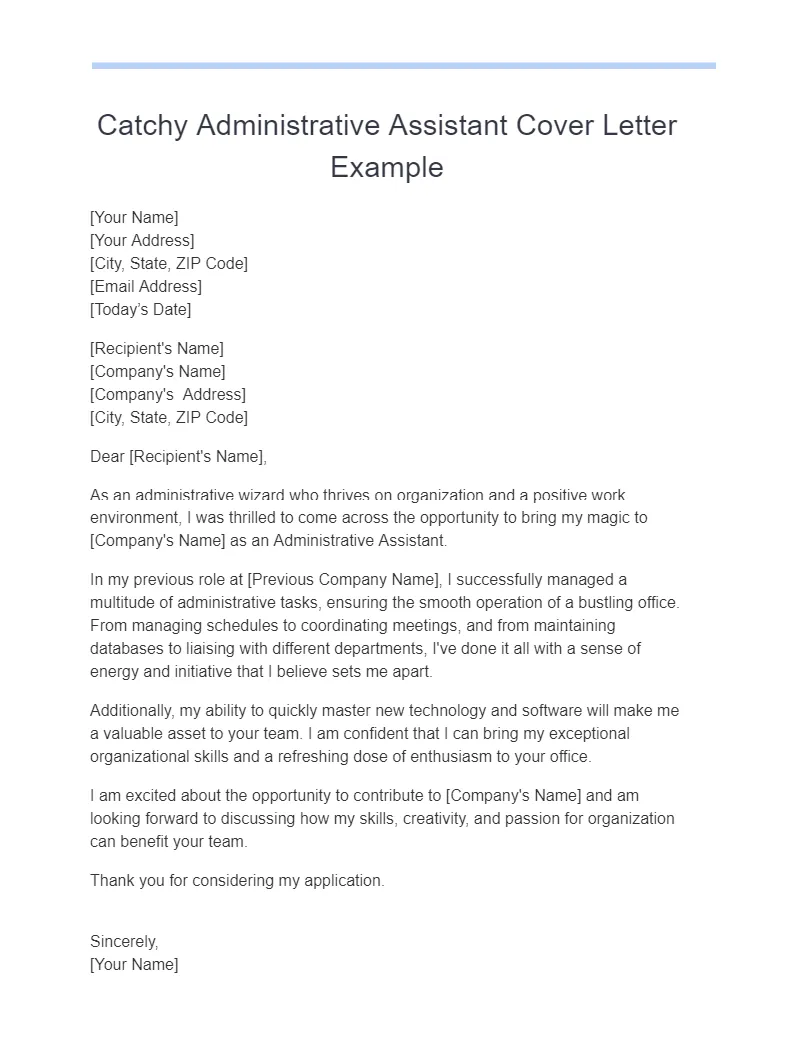Crafting a Stellar Admin Assistant Cover Letter
Landing an administrative assistant position requires more than just a strong resume; a well-crafted cover letter is your first opportunity to make a lasting impression. It’s your chance to showcase your personality, highlight relevant skills, and demonstrate your genuine interest in the role. This guide provides a comprehensive approach to writing a stellar cover letter that grabs the attention of hiring managers and sets you apart from the competition. We’ll cover everything from understanding the admin assistant role to avoiding common mistakes and using action verbs to make your application shine. A compelling cover letter can significantly increase your chances of securing an interview and ultimately, the job. Let’s get started on how to write one.
Understanding the Admin Assistant Role
Before you start writing, it’s essential to understand the core responsibilities and requirements of an administrative assistant. This understanding will help you tailor your cover letter to the specific needs of the employer. Researching the company and the specific job description allows you to focus on the skills and experiences that align with the role and its requirements. The more you know about what the employer seeks, the better you can present yourself as the ideal candidate. Tailoring your cover letter is a crucial step in showcasing your understanding of the position and increasing your chances of getting noticed.
Key Responsibilities of an Admin Assistant
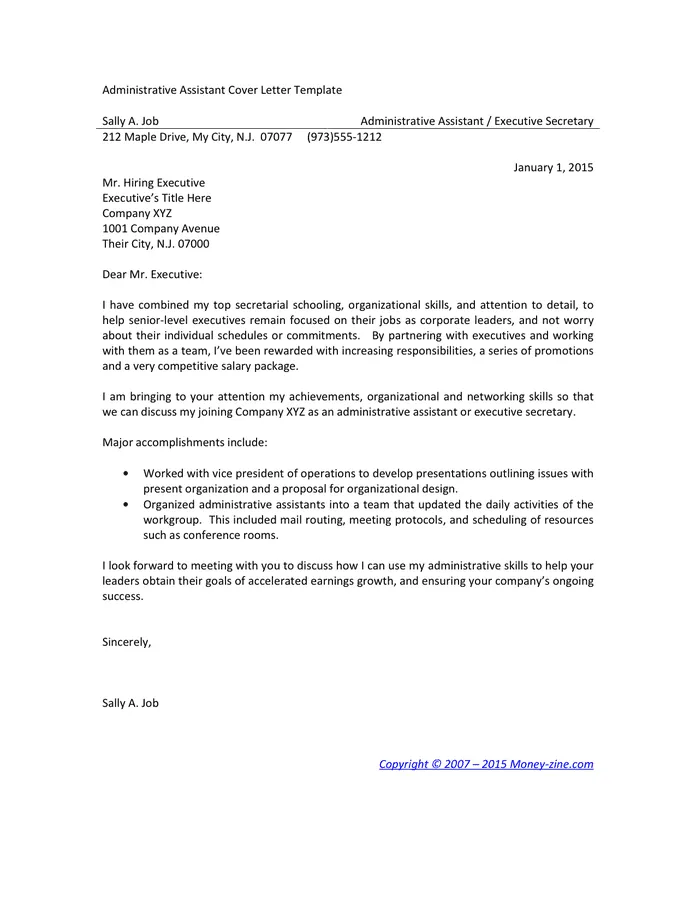
Administrative assistants perform a wide range of tasks that are essential for the smooth operation of any office. Core responsibilities often include managing schedules, coordinating meetings, handling correspondence, and providing general administrative support. Other duties can encompass tasks such as data entry, managing office supplies, and assisting with travel arrangements. Being aware of these responsibilities helps you to focus your cover letter on demonstrating the skills and experiences most relevant to this role. By showcasing your abilities in these key areas, you can demonstrate your suitability for the position.
Skills to Highlight in Your Cover Letter
Your cover letter should highlight the skills that make you a strong candidate. Focus on those skills that are most relevant to the job description. This is your chance to impress the hiring manager with your qualifications and convince them that you possess the right attributes for the role. Whether it’s strong communication skills, organization, or proficiency in specific software programs, make sure to emphasize how you have used these skills in previous roles. Showcasing your skills effectively is critical to securing an interview.
Communication and Interpersonal Skills
Excellent communication skills are crucial for administrative assistants. This includes both written and verbal communication. Highlight your ability to communicate clearly, concisely, and professionally. Provide examples of your experience in corresponding with clients, drafting emails, and preparing reports. Interpersonal skills such as active listening, empathy, and the ability to build rapport are equally important. Mention your experience in handling difficult situations or dealing with a diverse group of people. These skills contribute to effective teamwork and positive work relationships.
Organizational and Time Management Skills
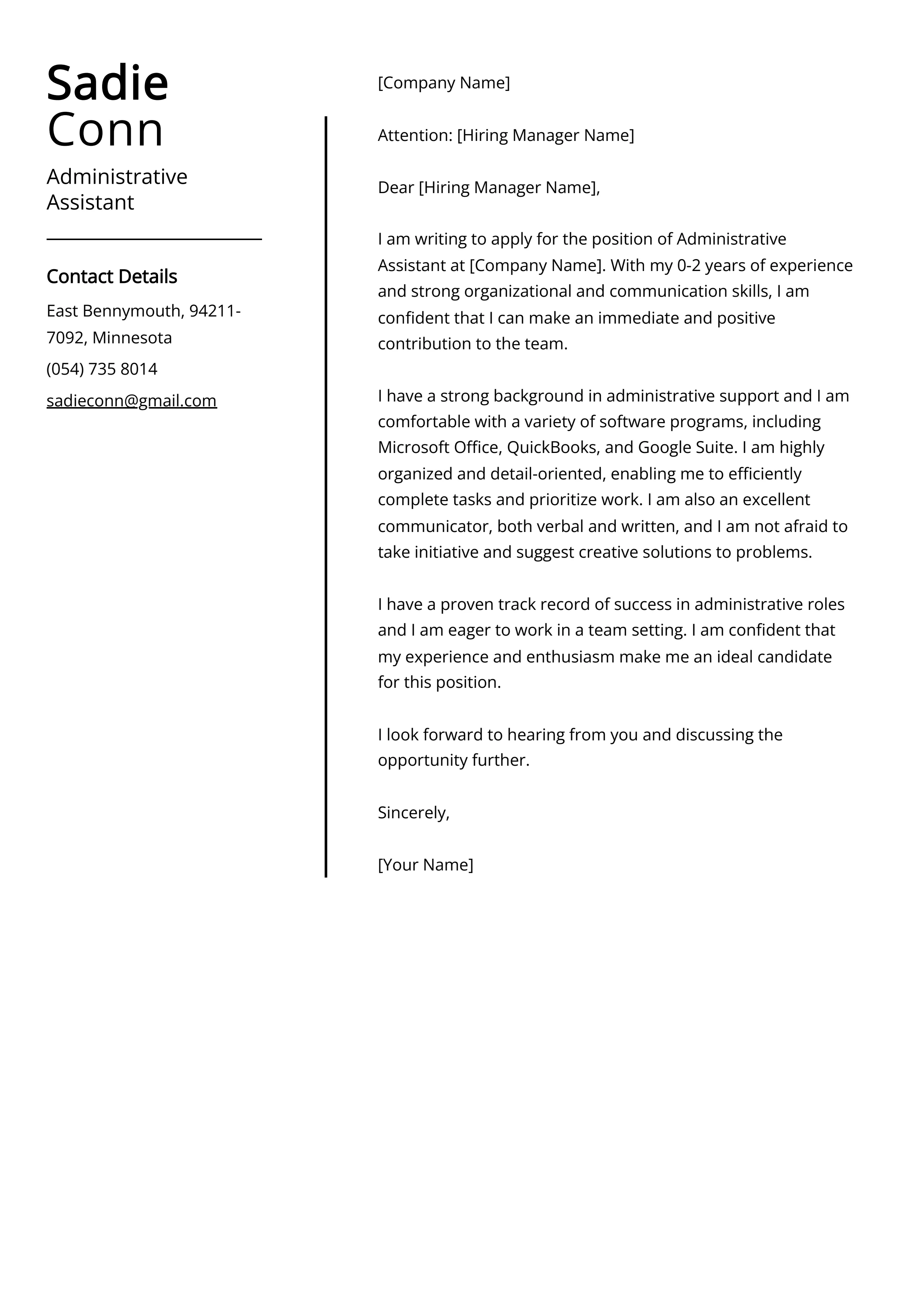
Admin assistants need strong organizational and time management skills to manage multiple tasks simultaneously and meet deadlines. Highlight your ability to prioritize tasks, manage schedules, and maintain an organized work environment. Give specific examples of how you have used organizational tools or strategies to improve efficiency. Mention any project management experience or how you have managed projects to keep them on track. These skills are essential for the smooth operation of the office.
Technical Skills
Technical skills, such as proficiency in Microsoft Office Suite, are often essential for administrative assistant roles. List the specific software programs you are familiar with and your level of proficiency. If the job description mentions any specific software, ensure that you highlight your experience with those programs. Additionally, mention other relevant technical skills like data entry, database management, or experience with office equipment. These skills will allow you to be able to perform the necessary tasks with speed and precision.
Structuring Your Admin Assistant Cover Letter
The structure of your cover letter is as important as its content. A well-structured cover letter is easy to read and provides a clear overview of your qualifications. Ensure your cover letter follows a standard format with a header, opening paragraph, body paragraphs, and a closing paragraph. This helps the hiring manager quickly find relevant information and appreciate your qualifications. A logical structure shows professionalism and attention to detail, making your application more impressive.
Header and Contact Information
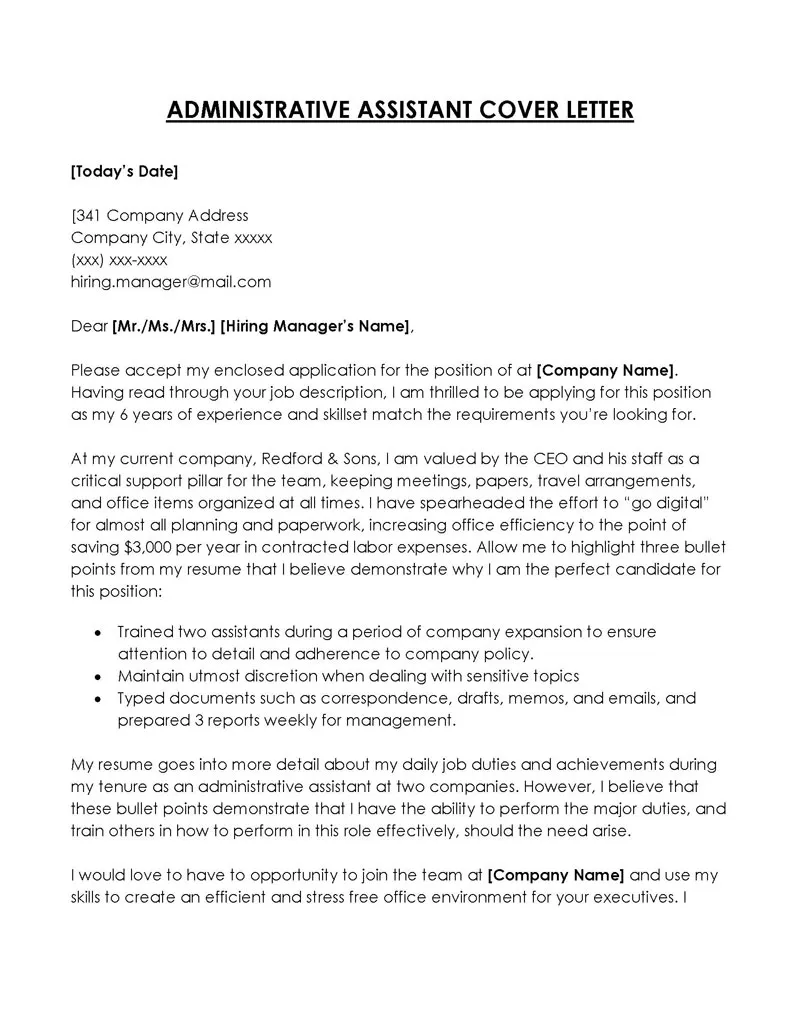
Start your cover letter with a professional header that includes your full name, contact information (phone number and email address), and the date. If you know the hiring manager’s name, address the letter to them directly. This shows you have put effort into your application and is a thoughtful touch. Include the company’s name and address below your contact information. This section sets the tone for the rest of your letter and provides the necessary contact information for the recruiter.
Opening Paragraph
Your opening paragraph should immediately grab the reader’s attention. Clearly state the position you are applying for and where you found the job posting. Briefly highlight your most relevant skills and experience. Show your enthusiasm for the opportunity and express your interest in the company. Keep it concise and to the point, making it clear why you are a good fit for the role. The opening paragraph serves as your first opportunity to make a great impression.
Body Paragraphs Highlighting Skills and Experience
The body of your cover letter is where you elaborate on your skills and experiences. Focus on the key requirements outlined in the job description. Use specific examples to demonstrate how you have used your skills in previous roles to achieve success. Break down your experience into clear, concise paragraphs, each focusing on a specific skill or achievement. This is your chance to show the employer that you possess the qualifications they are looking for.
Quantifying Achievements
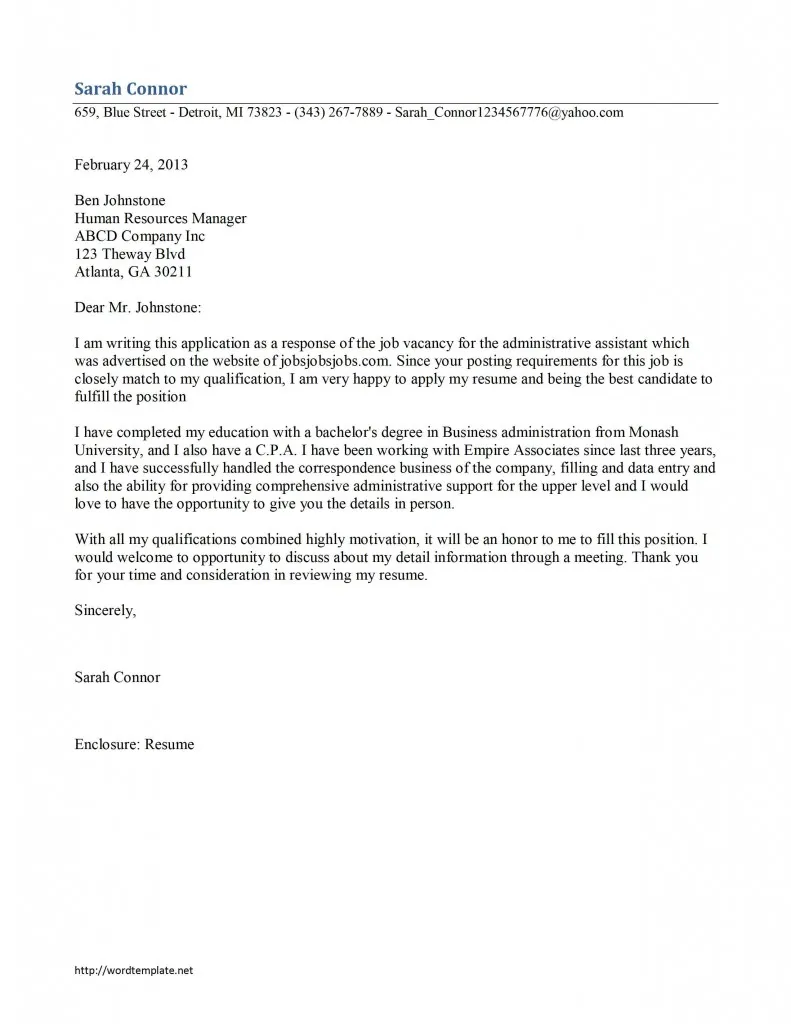
Whenever possible, quantify your achievements. Use numbers and data to demonstrate your impact in previous roles. For example, instead of saying “Managed a busy schedule”, say “Managed a schedule for 10+ team members, ensuring 100% of deadlines were met.” Quantifying your achievements provides concrete evidence of your capabilities and makes your claims more credible. It also allows you to make a greater impression on the hiring manager.
Tailoring to the Specific Job
Tailor your cover letter to each specific job you apply for. This shows that you have taken the time to research the company and understand their needs. Review the job description and identify the key skills and experiences they are seeking. Customize your cover letter to emphasize these qualifications and demonstrate how you can meet their specific requirements. This can significantly improve your chances of getting an interview.
Closing Paragraph
Your closing paragraph should summarize your interest in the position and reiterate your enthusiasm. Thank the hiring manager for their time and consideration. Include a call to action, such as expressing your availability for an interview. Be polite and professional in your closing, and ensure that you sign off appropriately. The closing paragraph is your last opportunity to make a positive impression.
Formatting and Proofreading
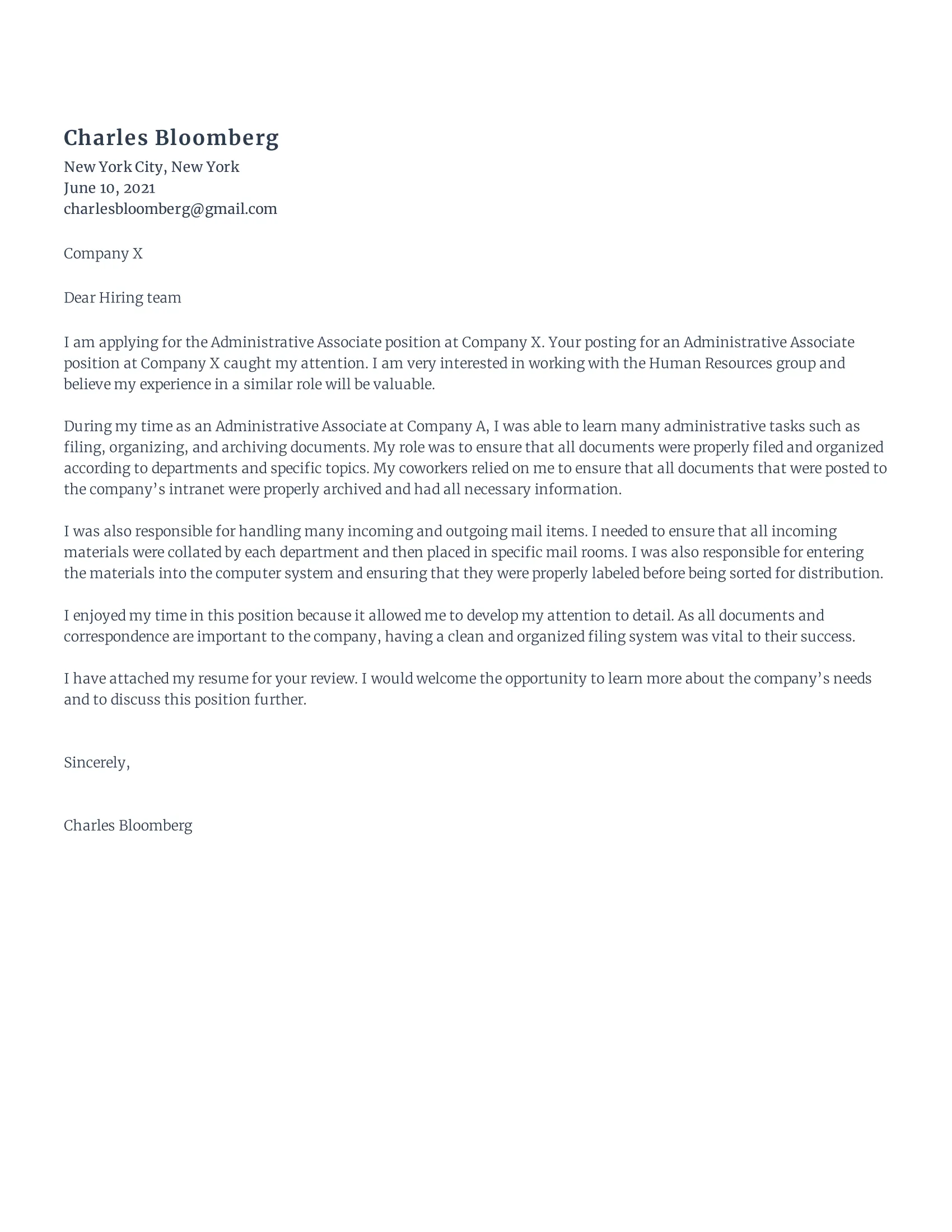
Formatting and proofreading are crucial elements in creating a polished cover letter. Poor formatting or grammatical errors can reflect badly on your attention to detail and professionalism. Take your time to carefully format your cover letter and thoroughly proofread it for errors. This will help you create a positive impression.
Font and Layout
Choose a professional and easy-to-read font, such as Times New Roman, Arial, or Calibri. Use a standard font size (11 or 12 points) to ensure readability. Maintain consistent formatting throughout your cover letter. Use clear headings and subheadings to break up the text and make it easier to scan. Use ample white space to prevent your cover letter from appearing cluttered and overwhelming. A well-formatted cover letter shows attention to detail.
Proofreading for Errors
Always proofread your cover letter multiple times. Check for any grammatical errors, spelling mistakes, and punctuation issues. Read your cover letter aloud to catch any awkward phrasing. Consider asking a friend or family member to review your cover letter as well. They might catch errors that you have missed. Attention to detail can make a great impact.
Action Verbs to Use in Your Cover Letter
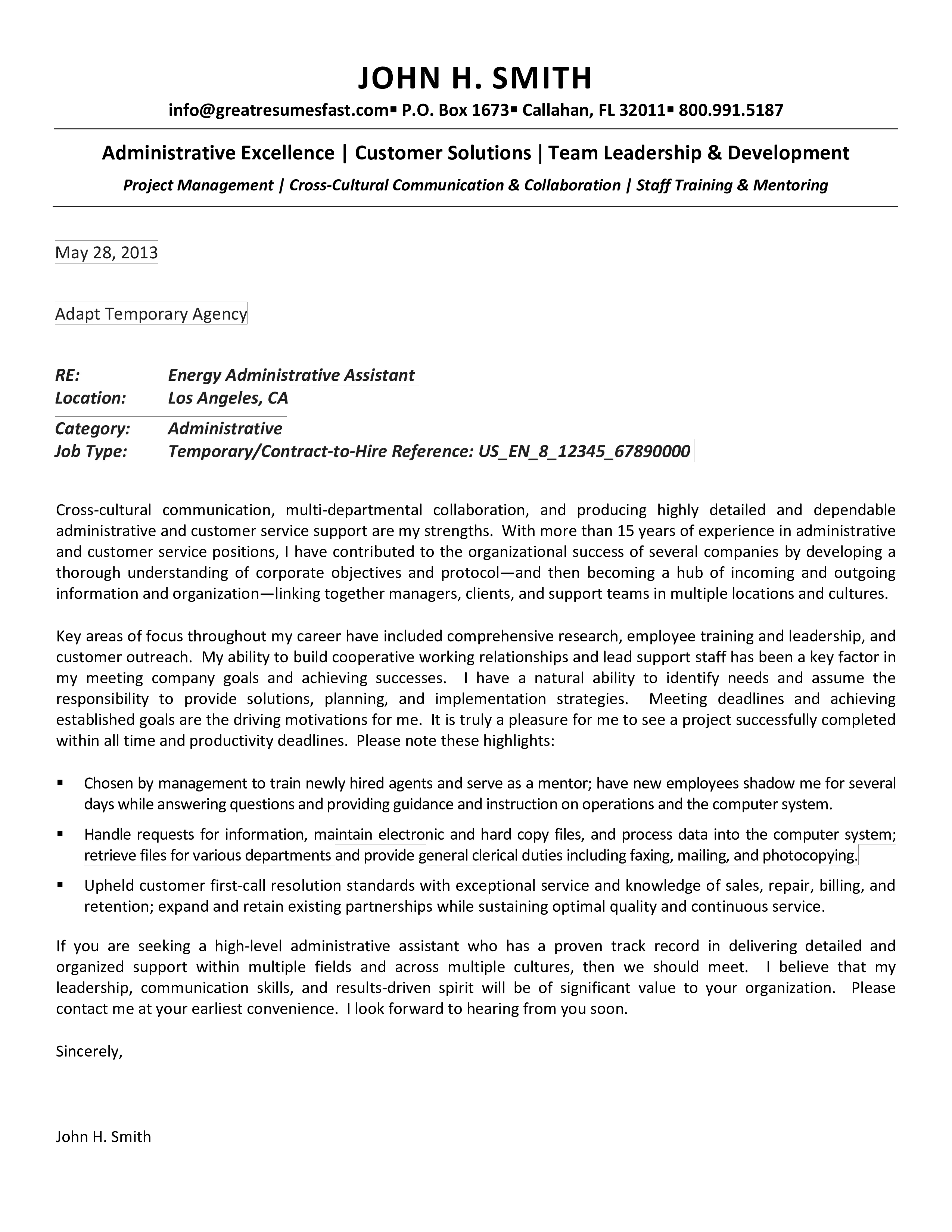
Using strong action verbs helps to make your cover letter more dynamic and engaging. Action verbs convey your skills and experiences in a more compelling manner. Here are a few examples of action verbs that can be used in your cover letter managed, coordinated, organized, implemented, created, developed, achieved, improved, and resolved. Use action verbs to provide dynamic details about your previous positions.
Common Mistakes to Avoid
Be mindful of common mistakes. Avoid these errors to ensure your cover letter is effective and increases your chance of being selected for the position. Avoiding these mistakes can significantly increase your chances of getting an interview and ultimately, the job. Paying attention to these common pitfalls will help you to write a cover letter that shines.
Generic Cover Letters
One of the most common mistakes is sending a generic cover letter. Such a letter lacks personalization and fails to demonstrate your genuine interest in the role. Always tailor your cover letter to each specific job and company. Research the company, understand the specific needs of the role, and highlight your relevant skills and experience. Generic cover letters do not convey your enthusiasm for the company.
Focusing on Yourself Too Much
While it is essential to highlight your skills and experience, avoid focusing too much on yourself. Focus on what you can do for the company and how your skills can contribute to their success. Show the hiring manager that you understand their needs and are eager to help them achieve their goals. Be sure to demonstrate your enthusiasm for the company.
Not Proofreading
Failing to proofread your cover letter is a major mistake. Typos, grammatical errors, and formatting issues can make your application look unprofessional and make you appear careless. Always proofread your cover letter multiple times. Consider using grammar and spell-check tools, and ask a friend or family member to review it. A cover letter that has been properly proofread will showcase your attention to detail.
In conclusion, writing a stellar administrative assistant cover letter is an important step in landing your desired job. By following the guidelines provided in this article, you can create a cover letter that stands out from the competition. Focus on the key responsibilities, highlight your relevant skills, and structure your letter clearly. Proofread your work, and avoid the common pitfalls. Good luck in your job search!
